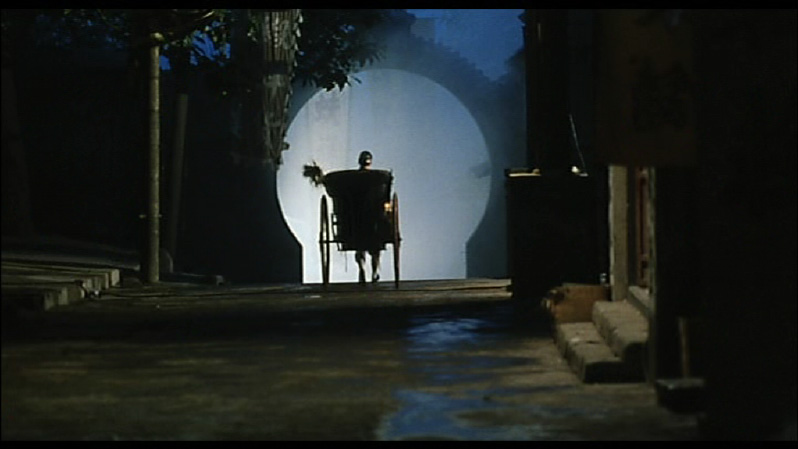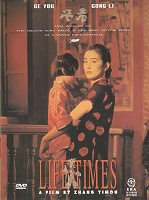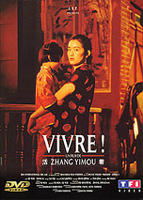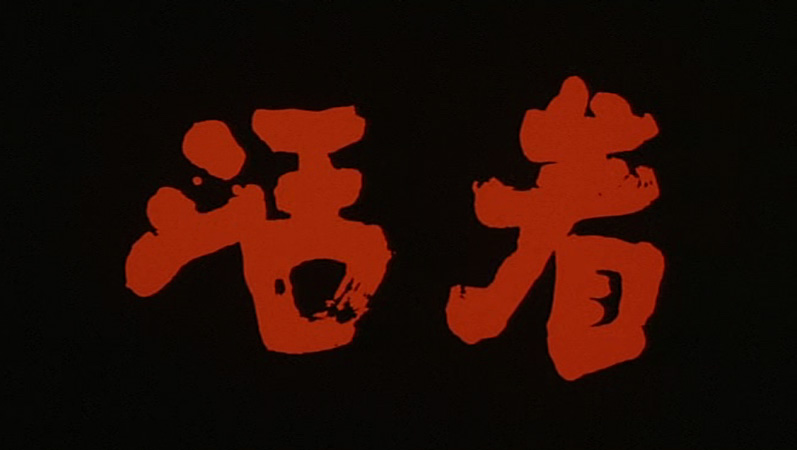
Huozhe
(To Live aka Lifetimes | Leben! | Vivre!)
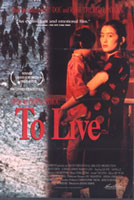
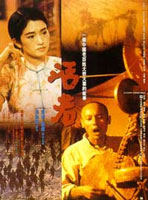
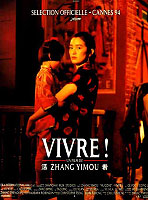
(click poster to the right to enlarge)
|
Director:
|
Zhang Yimou | |
|
Producer:
|
Chiu Fu-Sheng, Kow Fu-Hong, Christophe Tseng | |
|
Associate Producer:
|
Barbara Robinson | |
|
Production Companies:
|
Era International / Shanghai Film Studios | |
|
Screenplay:
|
Yu Hua, Lu Wei (based on the novel by Yu Hua) | |
|
Cinematographer:
|
Lu Yue (35mm Colour, 1.85:1) | |
|
Editor:
|
Du Yuan | |
|
Music Score:
|
Zhao Jiping | |
|
Musical Direction/ Supervision:
|
Tao Jing | |
|
Art Director:
|
Cao Jiuping | |
|
Costumes:
|
Dong Huamiao | |
|
Sound:
|
Jing Tao | |
|
Cast:
|
Ge You (Fugui), Gong Li (Jiazhen), Niu Ben (Town Chief), Guo Tao (Chunsheng), Jiang Wu (Er Xi), Ni Da Hong (Long Er) | |
|
Runtime:
|
132 min | |
|
Premiere:
|
18 May 1994 (Cannes Film Festival) | |
|
Awards:
|
Cannes Film Festival 1994 Best Actor: You Ge; Grand Prize of the Jury, tied with Utomlyonnye solntsem (1994); Prize of the Ecumenical Jury; Nominated Golden Palm BAFTA Film Award 1995 Best Film not in the English Language |
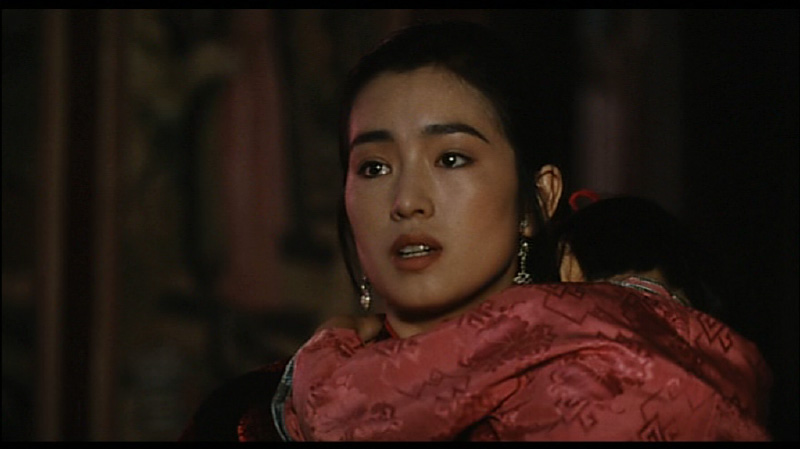
|
"Zhang Yimou's latest film has been called "epic.'' But its sensibility is less grand than accute, covering some forty years of history (moving from the rigid class hierarchy of 1940s China through the civil war and Cultural Revolution) through close focus on the experiences of one small family. The travails of Fugui, his wife Jiazhen (Gong Li), their daughter and son, are harsh and even tragic, but the film remains densely ironic, such that horrific events become increasingly absurd, often framed as a kind of awkward comedy. This frankly brilliant mix of emotional tones sharpens the film's political commentary, which is by turns indirect and rambunctiously explicit. Reading these events is further complicated by Zhang's typically beautiful visuals (carefully observed details as well as stunning panoramas) and an astonishing soundtrack (not so much background music, but sounds, as when a huge army of footsoldiers is introduced by the barely discernable thunder of their thousand steps, so that when they become visible, running toward the camera over a distant hill, the effect is literally breathtaking). ... The subtlety, potency, and majesty of his work are undeniable. Like Red Sorghum, Ju Dou, Raise the Red Lantern, The Story of Qui Ju, this film demonstrates a restless, courageous virtuosity; exhilarating and ingenious, it moves in ways that most films can't even imagine."
— Cynthia Fuchs "Zhang's next co-produced and financed film To Live, was shown at Cannes without the authority's permission and pre-sold before it could be censored which also happened to Tian Zhuangzhuang's The Blue Kite. ... In contrast to The Blue Kite Zhang doesn't want to emphasise the tragedies and sufferings that Chinese people have learnt to regard as endemic, but rather the fortitude and general good humour that sustain them. The focus on the 'good humour' might have saved Zhang's career. ... Those incidents have resulted in the government introducing new regulations to prevent them 'losing face'. From now on the authorities demand that future 'joint-venture' productions must be principally financed in China, and then the negatives of those films must be processed and kept in China." "Director Zhang Yimou is well known for his expressive film-making, combining a sure touch for human affairs with events on an epic scale, but Huozhe is special. In a superficial way Fugui and Jiazhen are purely struggling to exist (hence the title), while of deeper interest are the sacrifices and compromises necessary. At all times their situation is precarious (mostly through the threat of being denounced as enemies of the Revolution) but they pull through, either alone or together, by dint of their will and determination. Added complexity arises through the fact that many critical turns are taken by chance, only revealing their consequences subsequently (such as Fugui's gambling loss). The moments of realisation which follow these junctures form some of Huozhe's strongest scenes. A script of such power demands actors of range and depth, which both Gong Li and Ge You are. Their total immersion into character is utterly convincing, bringing forth joy, laughter, understanding, humility and unbearable agony. There is also a real spark between Li and You, a sense of actual love - it's impossible to understate the excellence of their performances. Huozhe is an extremely emotional picture but it's the roles which bring tears, so devastating are the tribulations which weigh on them. For completion, the other players are fine, the sets and locations fitting and the sparse score appropriate. Huozhe indicates just what cinema is all about and why I love it so." "The fact that To Live was presented as character-driven drama helped the film to overcome the hurdle of history", says Robinson. "By To Live, Zhang was a star director. He had a reputation for doing different things with each film. To Live was his first epic story, and touched on a more modern China. It was also not preachy about politics. They were backgrounded to the drama. Yet To Live makes some clear political points, even if they are rendered in an easily digestible form. When it comes to column space, though, marketers realize that the 'special' attention Chinese authorities pay their filmmakers is good for publicity. Journalists and marketing managers alike know that Western editors are more amenable to running articles on Chinese film directors if there is a political angle. Era's campaign for To Live at Cannes in 1994 played upon the fact that Zhang had elected to stay in China to appease the authorities because the film had not been officially granted permission to leave the country. The press conference saw gong Li sitting next to an empty chair bearing the name-card Zhang Yimou. In fact, may of the foreign press, unaware of the need for 'face-saving' in Chinese bureaucratic circles, assumed that Zhang had actually been banned from attending - something that didn't hurt the film's publicity at all." "Not unlike Abbas Kirostami’s films, the simplicity and elegance portray many hidden themes that hit with deep and lasting impact. Addiction, death, separation, birth, hardship, friendship, war, fortune are all explored with an adept level of un-cloying sentimental balance." "... die Darstellung des Krieges im Revolutions-Epos Leben! (Huozhe) kommt ohne Gräueltaten und ohne blutige Schlachtengemälde aus. Die Szenen könnten von Brecht oder Beckett stammen - so verfremdet und reduziert, wie der Krieg hier dargestellt wird, wirkt er wie absurdes Theater. "Dieses absurde Gefühl, das gilt auch für das Schicksal der Hauptfiguren, sie sind wie Grashalme, die ins Wasser geworfen wurden und mit der Strömung treiben. Das ist das typische Schicksal und die Mentalität der normalen chinesischen Massen", meint Zhang. ... "Die Chinesen haben soviel durchgemacht im Leben, aber trotzdem glauben die meisten, dass es irgendwann besser wird. Das ist das Hauptthema des Films, dessen chinesischer Originaltitel übersetzt einfach 'am Leben bleiben' heißt. Darum geht es. Das ist einerseits normal, andererseits aber bedeutender als heldenhafte Taten." |
ERA Home Video NTSC (Taiwan) Region 0 vs. TV1 Vidéo PAL (France) Region 2
R0 screenshots and R0 review by Gary Tooze / dvdbeaver.com
|
|
|||
|
Distribution:
|
ERA Home Video Region 0 (Taiwan) |
TF1 Vidéo Region 2 (France) |
|
|
Runtime:
|
126:36 min | 127:16 min (+ 4% PAL Speedup = 132 min) | |
|
Video:
|
1.69:1/4:3 Letterboxed WideScreen Average Bitrate: 4.52 mb/s NTSC 720x480 29.97 f/s |
1.85:1/16:9 Average Bitrate: 6.93 mb/s, 6.46 GB PAL 720x576 25.00 f/s |
|
|
Audio:
|
Mandarin Dolby Digital 2.0 Surround | Mandarin Dolby Digital 2.0 Surround Français Dolby Digital 2.0 Surround |
|
|
Subtitles:
|
Traditional Chinese, English (removable) | Français (non-removable in the Mandarin version) | |
|
Features:
|
• None | • Interview with Gong Li (Cannes 1994) (4:3, 05:38 min) • Theatrical Trailer (16:9, 02:40 min) • Filmographies: Zhang Yimou, Gong Li • Web Access |
|
|
|
DVD Release Date: 3rd quarter 1998 Keep Case Chapters: 9 DVD Encoding: NTSC Region 0 SS-SL/DVD-5 |
DVD Release Date: 6 December 2000 Keep Case Chapters: 15 DVD Encoding: PAL Region 2 SS-SL/DVD-9 (7.3 GB) |
|
Comment:
|
Compared to the ugly, letterboxed and vertically squeezed ERA transfer, the TV1 Vidéo R2 DVD is much superior in every domain: it's anamorphic, has better sharpness, definition, detail, more accurate colours. The encoding of the TV1 Vidéo transfer, alas, is nevertheless sub-standard. Compression artifacts, mosquito noise, edge enhancement and aliasing will give you a headache (cf. the beginning of chap.7). French subtitles can't be removed on the Mandarin soundtrack.
|
Frame 1: Menu
(ERA NTSC R0 left, TV1 Vidéo PAL R2 right)
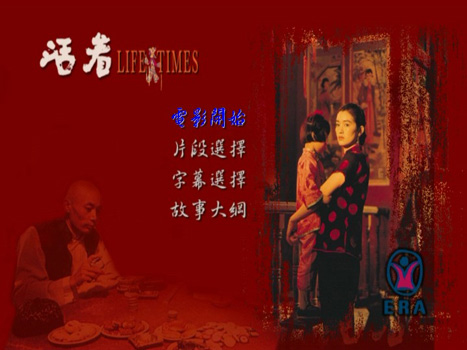 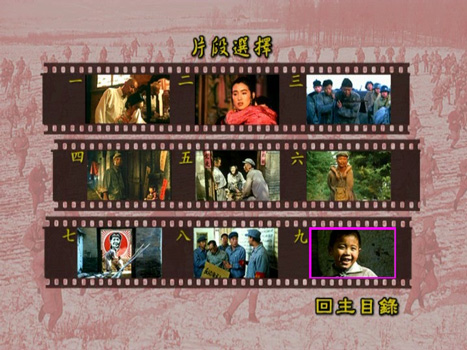 |
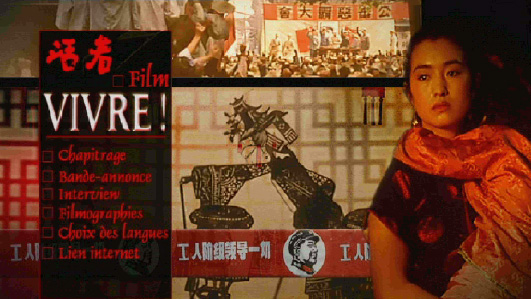 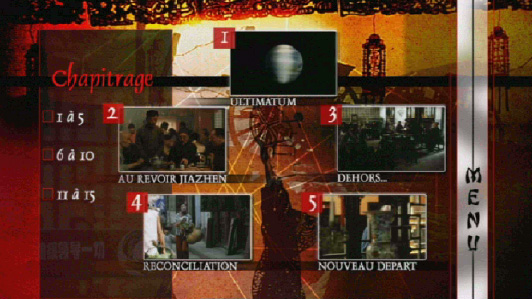 |
Frame 2
(ERA NTSC R0 top, TV1 Vidéo PAL R2 bottom)
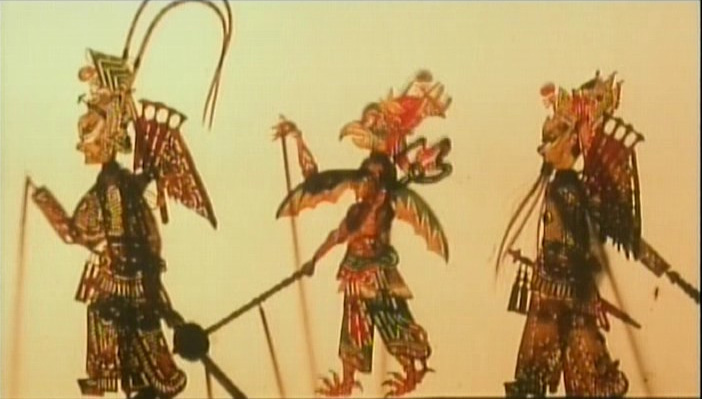 |
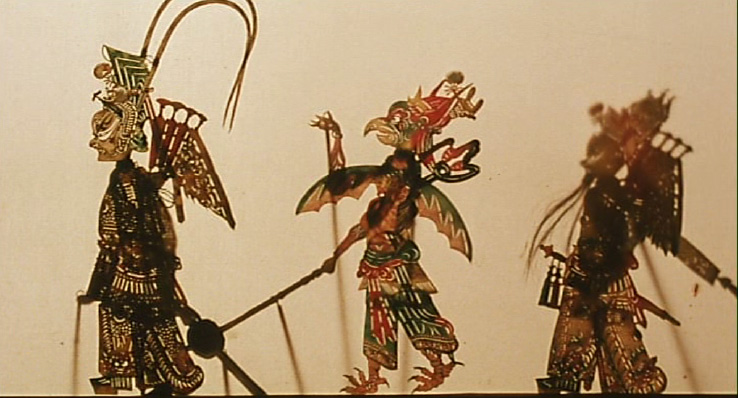 |
Frame 3
(ERA NTSC R0 top, TV1 Vidéo PAL R2 bottom)
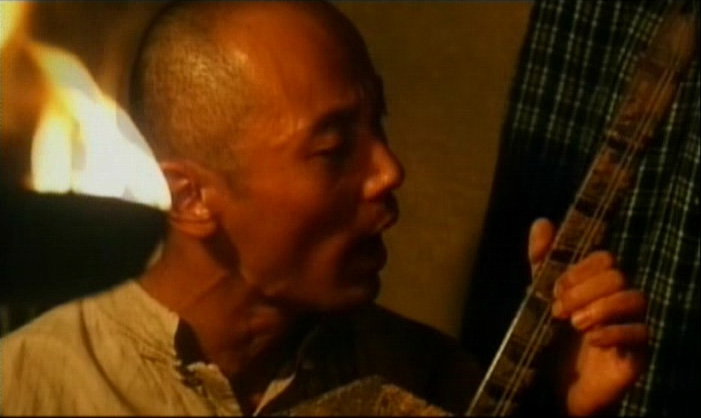 |
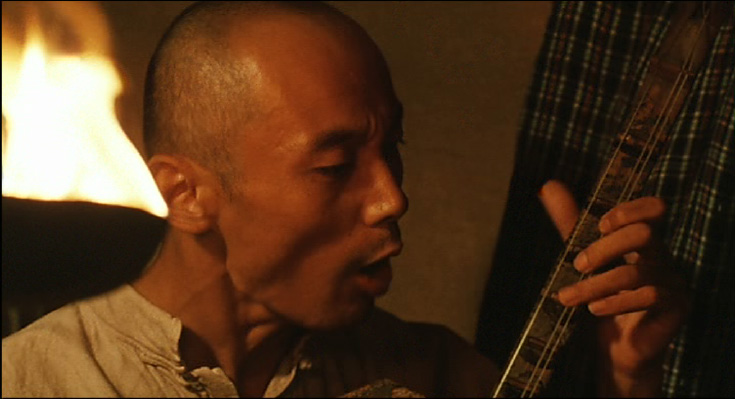 |
Frame 4: Original Frame Sizes
(ERA NTSC R0 Letterboxed 720x540 top, TV1 Vidéo PAL Anamorphic 1024x576 R2 bottom)
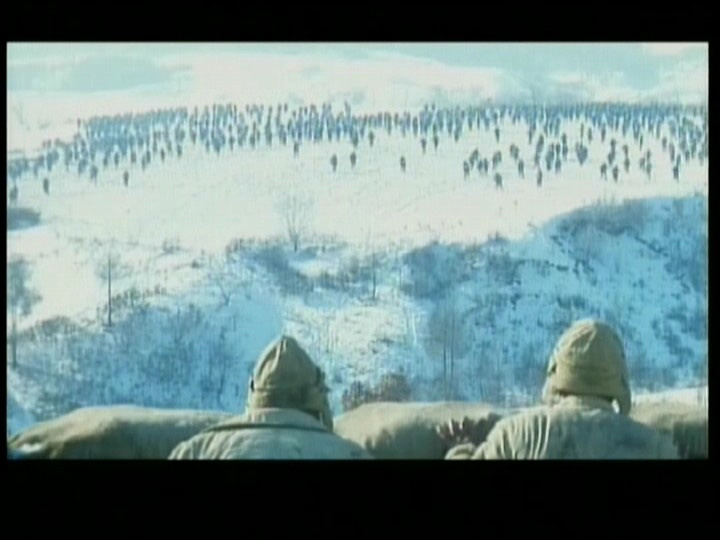 |
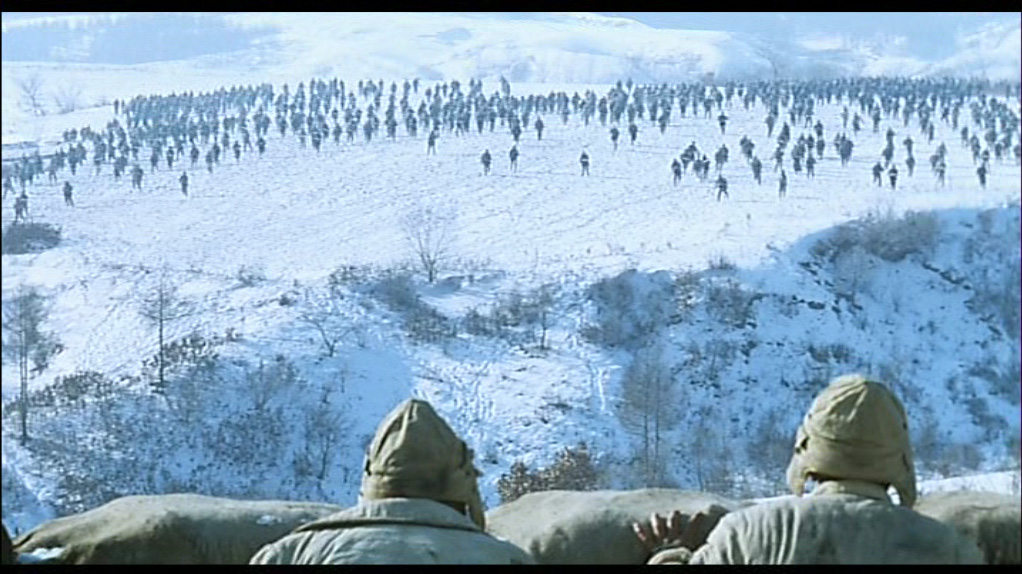 |
Frame 5
(ERA NTSC R0 top, TV1 Vidéo PAL R2 bottom)
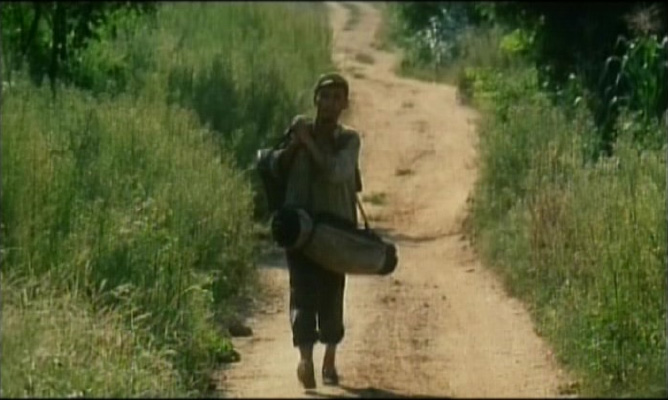 |
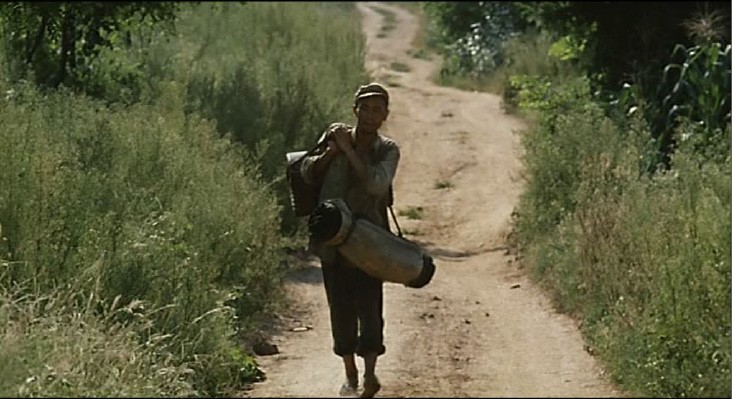 |
Frame 6
(ERA NTSC R0 top, TV1 Vidéo PAL R2 bottom)
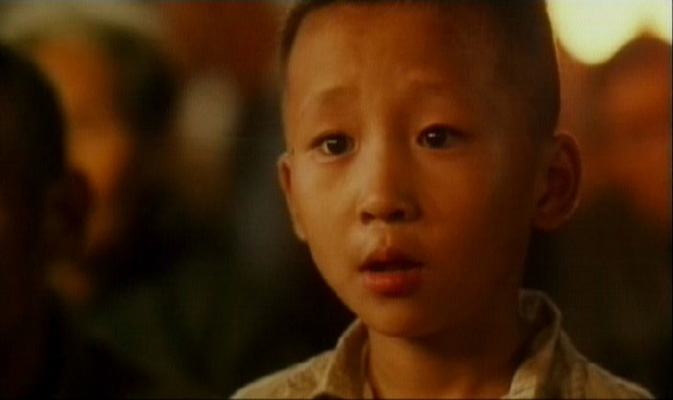 |
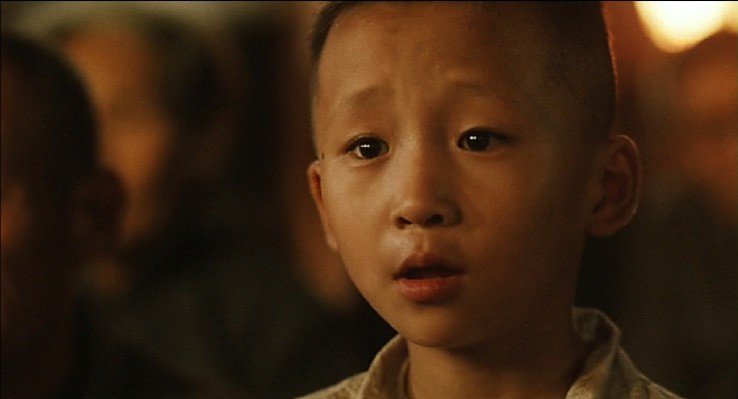 |
Frame 7
(ERA NTSC R0 top, TV1 Vidéo PAL R2 bottom)
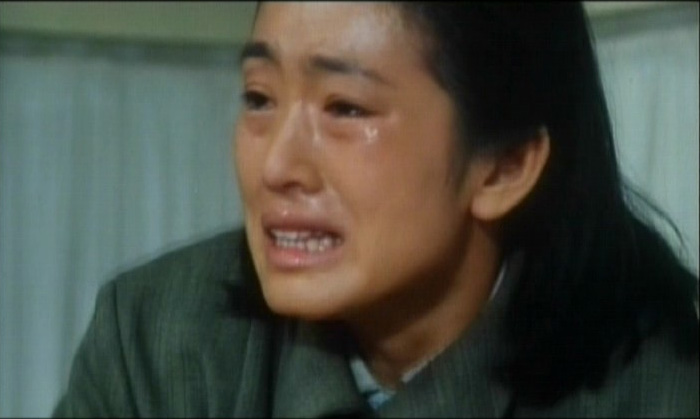 |
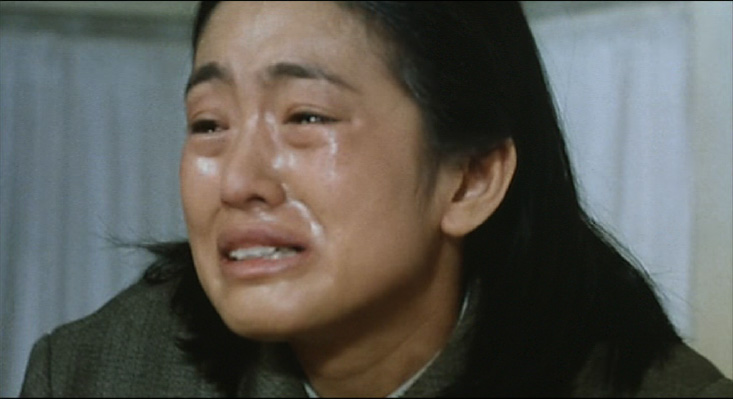 |
Average Bitrate ERA NTSC R0:
4.52 mb/s
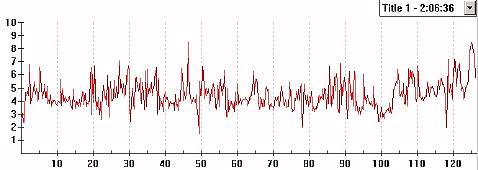
Average Bitrate TV1 Vidéo PAL R2:
6.93 mb/s
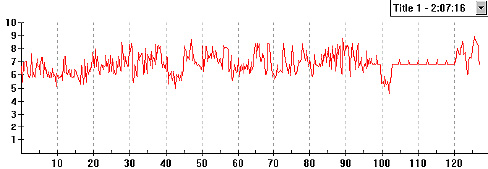
The Vertical axis represents the bits transferred per second. The Horizontal is the time in minutes
|
This is a strictly non-professional and non-commercial DVD review. Don't expect industry reference work! All ChiaroScuro captures are taken under MacOS X.2 using VideoLAN and Snapz ProX. For further methodological remarks see DVDBeaver (click on "Methodology"): "We are not a lab and are doing a good a job as our time and energy permits. Thank you for understanding." |

